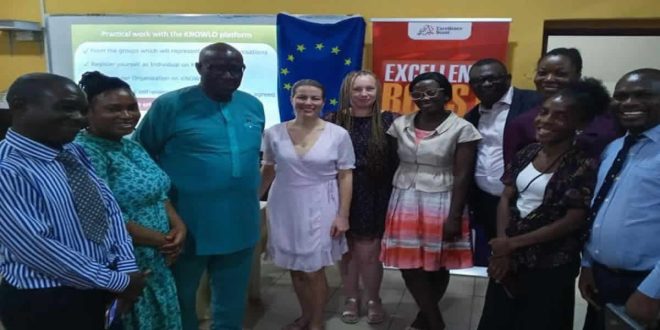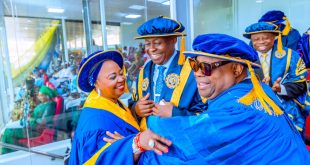As knowledge acquisition becomes more competitive, the need for educators to be vast is becoming more compelling. A five-day training activity on Excellence Culture in Educational Organisations laid bare steps at improving learning outcomes to entrench excellence culture in educational institutions. While attendees attest to being exposed to fresh vistas for knowledge impartation, organisers say holistic organisational development of the school structure is the major objective, ENO-ABASI SUNDAY writes.
Obsolete knowledge, failure to keep pace with fast-changing digitisation and digital milieu, poor understanding of students’ needs, as well as mounting organisational challenges are some of the factors that militate against increase in personal and pedagogical competences of teachers.
It is in a bid to ensure that Vocational Educational and Training (VET) trainers/teachers are up to speed in the business of knowledge impartation that the European Union (EU) is sponsoring the Excellence Boost Project, which also has components of organisational development.
Excellence Boost is a two-year project aimed at developing a lifelong learning pathway for VET trainers/teachers, so that teachers can more easily understand their professional path for lifelong development, and also to develop a learning-sharing platform for innovative VET schools and organisations. Among the target audience is VET teachers/trainers, VET school directors, etc.
The initiative involves eight organisations from countries (four in Europe and four in Africa)- Slovakia, Portugal, Spain, Latvia, South Africa, Burundi, Tanzania and Nigeria.
Deloris Mundo Limited, which is the organisation representing Nigeria in the project, is partnering with schools in the country to propagate excellence culture in educational institutions via training and seminars, which would help the schools to understand organisational excellence, sustainability, self-assessment and continuous improvement.
According to, Olaolu Odeleye, who spoke on behalf of Deloris Mundo Limited, all these would be achieved through exposing teachers and managers in these schools to trainings that would boost their competence level, improve their individual roles, responsibilities, and add to how they would positively impact the schools’ environment.
Understanding of excellence approach and the main excellence criteria; its application in schools’ environment; initiation and implementation of the process of excellence, including self-assessment and usage of various supporting methods for schools; idea management, continual improvement and some fundamental basics of the KNOWLO framework European Foundation for Quality Management (EFQM) model – (the most widely used European Excellence model) etc., formed the kernel of discussions at the five-day learning, training activity on Excellence Culture in Educational Organisations, which ended in Lagos, recently. It had in attendance teachers and schools’ administrators among others.
Commenting on why the European Union is interested in teacher development in Nigeria, and the entrenchment of the culture of excellence in schools, the Lead Trainer at the training, Vanda Novoksonova, said: “The EU considers the development of schools a very important issue, hence, it is interested in teacher development because it believes that schools are the future of countries. So, if schools really constitute the future of countries, it is important to invest in, and educate teachers on the best way to deliver on their assignments. Logically, investing in teacher-development will directly and indirectly boost the culture of excellence.”
Considering the fact that most schools don’t want their teachers to be peer-reviewed in order to preserve their trade secrets, since most schools want their students to always be shinning stars Novoksonova said: “This is a challenge that we have noticed in many countries not only in Nigeria. And that is part of the challenge that we are trying to do away with, through changing the teachers’ mindsets, making them open to sharing experiences and learning from each other, as well as, being open to doing things differently from the way that they are doing now in order to achieve much bigger benefits.”
Shedding more light on the initiative, Project Co-author, Adela Vitkovska said: “Even though the initiative has an initial two-year lifespan, we will continue to develop Excellence Boost further, and we will write to get more partnerships because the partnership that we currently have with the EU is a great and an excellent one.
“This first year is actually the learning phase, and next year will be the implementation phase, and we will like to prepare new projects to continue with the same partnership and to ensure a follow-up. But I agree with you that we need more time to make a lot of impact. But the truth is that, we will like to do as much as we can in this project, indeed, much more than was foreseen in the beginning.”
Vitkovska added: “In addition to that, this project is not just about teacher development, but the stage that we are now, the focus is also about holistic organisational development. Teachers are a big part of the school, but not the only one. So, we are touching different levels of workers and different parts of the school structure for the overall benefit of learners. The entire project as conceptualised, and the way that it was started will deliver mutual benefit to the different sides, that is to local schools and international partners as every one is learning.”
Commenting on the absence of policymakers and other major stakeholders in the sector from the training, the project co-author said: “As it happens in the EU, sometimes when policies are being developed, it does not mean that policy makers are fully ready to go flow with it because they need time to prepare some documents, and to make some recommendations. But the initial verve and development is any way up to each school and organisation. So, we believe that the first step is to meet staff of interested schools and organisations before we reach the decision makers and other stakeholders. If we are to start communicating to decision makers about what we are offering, of course, they would ask, ‘where is the evidence that the solution that you are proposing is good enough?
“So, it was our preference to initiate such training activities as we have just done here in Nigeria and the other three African countries, including Tanzania, Burundi and South Africa. Discussions are ongoing with our local representative- Deloris Mundo Limited, and these kinds of activities, including stakeholders’ sessions have been lined up for next year as Step 2. Currently, we are working with schools to see their results and effects of our concept, and how they bring the training and development programmes to bear in their jobs.
In the pilot scheme, staff members of Mind Builders School, and Bizben School, in Lagos were taken through their paces by trainers from Nigeria, Latvia and Czech Republic, with the programme initiators promising to support the schools in their continuous improvement process.
They have also promised to partner with more schools in the next round of training activities in order to allow the desired excellence culture to take roots and spread across the country.
Doing a post-mortem of the training, the Principal of Mind Builders School, Mr. Kunle Agbelu, said: “the training has been a transformative experience, equipping me with the tools and perspectives needed to enhance my role as a leader in education. The integration of smart learning principles, sustainable development goals, and client-centered approaches will undoubtedly contribute to improved work quality, curriculum delivery, student’s outcomes, and personal growth.”
Enumerating his key takeaways from the comprehensive training programme aimed at equipping individuals with the knowledge and skills needed to raise global standard leaders, strongly emphasised the importance of being an advocate and motivator for smart learning organisations through actively promoting continuous learning, communication, and cooperation within the organisational framework.
He added that an integral part of the training involved “assessing my strengths and areas for improvement using the KNOWLO Platform. Identifying areas for improvement including organisational and people management, as well as result/benchmarking. Learning, communication, and cooperation were also highlighted as essential criteria for smart learning organisations.
“The training has inspired me to practice inclusion and diversity in a more holistic manner. This approach will engage my team, fostering critical and creative thinking while respecting each learner’s abilities and attributes,” Agbelu said, adding: “I plan to conduct regular training and retraining sessions for my team, focusing on the criteria for a smart learning organisation. This continuous improvement process will contribute to enhanced work quality over time.”
On what impact the training would have on curriculum delivery and learning outcomes, the principal said: “Going forward, the curriculum will incorporate the 17 SDGs through various channels such as presentations, projects, and other instructional methods. Initiatives like “Going Green” drive will address climate action, and intentional efforts will be made to practice gender equality in the school community.”
Also, “the training emphasised designing the curriculum to address clients’ (students/pupils) needs, building on their strengths, and creating a positive learning environment. Instructional delivery processes will be personalised, engaging, and aimed at empowering clients to reach their full potential. Students will be appraised using both formative and summative assessment methods. Beyond academic performance, life and entrepreneurial skills will also be evaluated.”
Besides committing to “being an advocate for smart learning organisations, incorporating and practicing the criteria outlined in the KNOWLO Application,” the school head added that “teachers under my supervision will be well-versed in the SDGs, ensuring differentiated learning instructions and a global awareness of pertinent issues such as gender equality and poverty.
“Importantly, the knowledge gained will influence my leadership style, making me more intentional in my interactions with the team, learners, and the school community,” he concluded.
Also commenting on the training, Head of School, Mind Builders School, Omole Phase 2 Annex, Mrs. Esan Oluwatoyin, said: “This training was well packed with information that is highly needed for raising global standard leaders. It was interacting all through. The fact that nationals of 12 countries were in attendance has further increased my network connection.
She stressed that learners will and the school will ultimately benefit from the new knowledge acquired, a development that would boost the excellence culture, which the school cherishes.
 Gistfox Your News Window To The World.
Gistfox Your News Window To The World.





